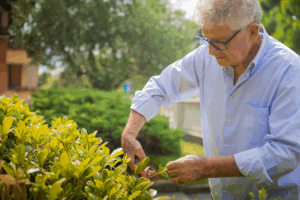1. Play memory games. Playing different cognitive games can have a crucial impact on brain health in later life while ageing in place. It may be easy enough for your loved one to list the planets in consecutive order away from the sun.
To increase the challenge, ask for them to list the planets in alphabetical order instead. The “picnic game” can also be fun. Here, a family Carer can start by saying, “My grandmother went on a picnic and took ______ (choose something starting with the letter “A”). They will then repeat that, offer something starting with the letter “B,” so the game will continue through the alphabet (or as far as possible until a player forgets). For additional difficulty, picnic items could be paired with a descriptive adjective also beginning with the same letter (e.g., “appetising apples,” “buttered bread,” etc.)
2. Participate in Conversation. Thought-provoking discussion requiring comprehension and a detailed response can also help to reduce the risk of cognitive decline and the need for in home care services. A family carer could compile a short list of possible topics like current news, the loved one’s childhood ambitions, or parenting tips to talk about during a physical or virtual visit. It’s better to ask open-ended and conversation-starting questions. For example, “Who was your favourite school teacher and why?” will require more thought to answer than “Did you like your school teachers?”

3. Stay positive. Difficult times, as can be felt while ageing in place, receiving in home care services, or residing in an aged care facility, can pull anybody down, and depression may lead to reduced brain function. Small things like watching children play, sipping a cup of tea, listening to nostalgic music, or sitting outside in the warm sun may boost a loved one’s mood and cognitive health. Laughing more can also help positivity. Research shows laughter can reduce cortisol – a stress-increasing hormone, and it just feels good to do. Considering the challenges of COVID-19, family carers could place a small joke book into a care package for delivery to a loved one living in aged care services. Alternatively, family carers could read funny stories to their family member via Zoom or by telephone.
4. Memorise Song Lyrics. We all have significant songs from our glorious youth. Family carers could choose a song and print off the lyrics to read through. Memorising lyrics can be a fun way for them to work their brains while connecting with their past. Once your loved one masters the song lyrics, try a poem, a list, or even a short story.
5. Gardening. Dig out the gardening gloves and the trowel! There are many health benefits of gardening for seniors. It can be a great outdoor activity to get your loved one physically active. Gardening allows them to get fresh air, lightly exercise (bending over, digging soil, carrying a water jug), and use their imagination to grow beautiful arrangements. The garden doesn’t have to be large — you can section off a small corner of the backyard or pour soil into a decorative box to place on a patio/balcony. A smaller garden will certainly make things easier for any older adult — as will a small stool to sit on if a senior is unable to bend over.

How Carers Can Promote Brain Health for Seniors
Family carers can play a crucial role in recognising a senior’s cognitive abilities and keeping those abilities sharp as they often spend the most time together. If something doesn’t seem quite right, the family carer will be one of the closest to the senior and can often be the first to spot the problem and alert healthcare staff in aged care services or in home care services. However, as a warning, seniors may try to hide their cognitive decline, and family carers may need to become detectives. I recall noticing my father’s increasing forgetfulness quite early. At first, I classified this as “senior moments,” but it turned out to be Alzheimer’s disease.
To be of the best help, family carers need to have the problem diagnosed early to find an effective treatment and increase the senior’s quality of life as they are ageing in place or receiving in home care services. As explained, a family carer may intervene in various ways, but for best results, they must act as soon as possible to slow down a senior’s cognitive decline. Additionally, family carers can support their loved one through this time by educating themselves on what to expect, regularly monitoring and/or assessing their loved one’s progress and creating a positive environment for them.
Resources:
As a leading age care provider, Home Care Assistance offers tailored in-home care services for older Australians, enabling them to live happier and healthier lives in the comfort of their own homes.
We offer private and government subsidised Care Packages and have office locations that are a registered NDIS provider. Our Care Workers undergo extensive training in order to deliver unmatched in-home aged care services where people can continue ageing in place. We are proud ambassadors of the My Aged Care government funded aged care program, enabling Australians to successfully navigate the process and gain approval for in-home care support packages. Home Care Assistance offers hourly care, specialised care, Alzheimer’s and Dementia care, hospital to home care, and 24 hour in home care.













